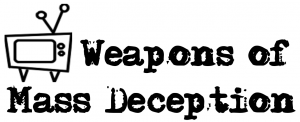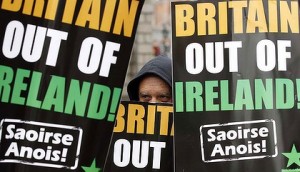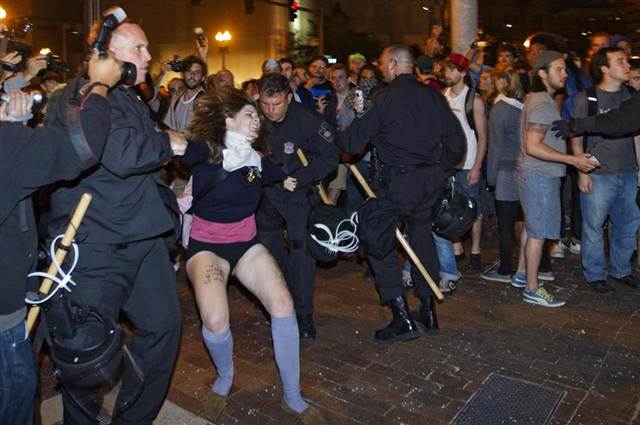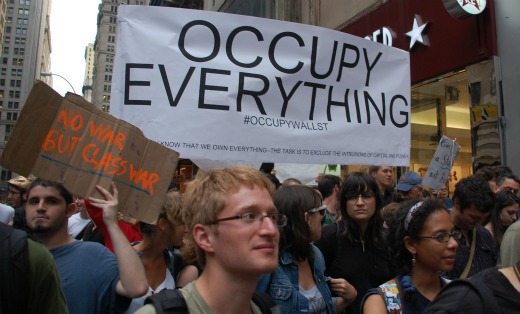Smoke Screen Media Coverage
As astonishing as it might seem, the hottest topic to take the Internet by rage has received very minimal, if not completely biased coverage by the mainstream media. The scattered reports barely make a blip in local newspapers, and are generally presented with very little attention given to the topic in question, and rarely connecting it to a mass movement, preferring instead to credit the activity to a lunatic fringe or a handful of participants with no real influence. However, it is a topic that monopolizes Twitter accounts, fills the spaces of personal blogs and has collected an International following. That topic is the occupation of the grounds where decisions are made concerning economics and politics. This occupation, which began as a demonstration at Wall Street, consists of literally pitching a tent and remaining in one spot for the duration of a protest, which, for some, have been several long weeks now, with permits ending and threats of forceful removal. Sometimes, the threats are carried out.
The media portends to complete confusion as to exactly what these protests, which have sprung up like mushrooms in over a hundred cities within the United States and spread its way across the ocean, are all about. They pick up on a few catch phrases, such as “corporate greed” and “we are the ninety-nine percent”, as though echoing the words of a new language. It’s almost as though the conscientious journalists of major publishing houses have not followed the erupting housing bubble, the bank bail-outs, the downsizing of companies aggravating unemployment, the increased expenditures in war-faring, and come to the conclusion that these events would have any real impact on the general public. They seem surprised that people are expressing needs and can’t imagine what needs should be so dire as to unite diverse interest groups into a single demonstration of solidarity.
Perhaps, it isn’t the subject of issues the media is so befuddled by, but the fact that the protesters refuse to recognize any particular political party as its driving force or representative. In a year of election campaigns, there are no groups rallying for the support of a candidate. In fact, Boston has made it clear they want to keep politics out of it. An article in the Washington Post writes that, “Despite having no single leader and no organized agenda, the protesters insist they are on the verge of translating their broad expression of grievance into a durable national cause. “The criticism has focused on the lack of cohesion in our message and demands,” said Arthur Kohl-Riggs, 23, a political activist from Madison, Wis. But what the critics don’t understand, he said, is “the value of forming a direct democratic movement” that is not controlled by political elites.”
No Politicians Allowed
This refusal to align itself with any political entity has stirred up a hornet’s nest, even among factions who assert “they are going to take back the government”. In fact, apparently, taking back the government for their own specific agendas seems to be exactly what these various factions want. They rally their followers around a basis of religious fervor, around immigration and or discriminatory laws, less money spent on social programs, although not on war, but never around the basic good of the constituents as a whole.
Eric Cantor, the House majority leader, has denounced “mobs” and “the pitting of Americans against Americans.” The G.O.P. presidential candidates have weighed in, with Mitt Romney accusing the protesters of waging “class warfare,” while Herman Cain calls them “anti-American.”
Michael Bloomberg, New York’s mayor and a financial-industry titan in his own right, was a bit more moderate, but still accused the protesters of trying to “take the jobs away from people working in this city,” a statement that bears no resemblance to the movement’s actual goals.
What are the goals of a movement that has motivated thousands of people to throw aside their individual differences, pack up a bag with supplies and squat in front of banking institutions, in city parks and town squares? On Wall Street, where the protests first created the momentum, the answer was relatively simple. The people who organized the protest on September 17, wanted to make their voices heard among those they felt were directly responsible for the economic crisis. Two weeks into the demonstration, without a particular statement of intent, the leaderless resistance movement, as it was called, was beginning to falter with a little uncertainty.
“At a certain point, there’s a valid criticism in people asking, ‘What are you doing here?'” protester Chris Biemer, 23, said on Day 11 of the demonstration. In an exchange that illuminated one of the dilemmas that any movement for change faces in trying to sustain momentum, Biemer and protester Victoria Sobel made it clear they had different visions for Occupy Wall Street.
Biemer, who recently moved to New York from Florida with a degree in business administration, says that ideally the group should team up with a nonprofit organization and get office space.
“It’s possible to stay here for months or longer, but at some point we’re going to become a fixture,” he said of their home in Zuccotti Park, a privately owned, publicly accessible plaza dotted with trees and flower beds about midway between the Stock Exchange and the former World Trade Center site.
Sobel, who like Biemer serves on Occupy Wall Street’s finance committee, disagrees and said the group’s strength lies in its ability to remain highly visible and in a place where anyone can visit and participate.
“It’s a moment of clarifying for us,” Sobel said, confident that as autumn’s chill turns to winter’s sub-freezing temperatures, Occupy Wall Street will stay put. “We’ll layer,” she said with a laugh, when asked how they’ll manage the cold.
Solidifying the Occupation
By October 4, the Occupy Wall Street protest had taken root nationally, with sympathy rallies occurring in Boston, Chicago, Los Angeles, and Washington D.C. On October 10, Chicago had drawn a list of demands for the Mortgage Banking Conference, even dressing as Robin Hood’s and floating down the river in kyaks to deliver the message: “It’s time for big banks to pay us back.”
Inside the mortgage bankster meeting, a fourth team of activists were embedded in the audience, ready to interrupt the banksters’ plenary conference. Two activists were able to interrupt the discussion panel before the banksters shut down the meeting entirely to avoid further interruptions.
Here are the demands that the protesters presented to the MBA:
1) Raise the marginal tax rates on the wealthiest individuals by ending the Bush Tax Cuts and supporting the Rep. Schakowsky’s Fairness in Taxation Act.
2) Close corporate tax loopholes and offshore havens, and institute a Financial Speculation Tax on risky Wall Street trading. All corporations should pay their fair share.
3) Enact a real jobs program that will put millions back to work repairing and upgrading our crumbling physical and social infrastructure.
4) Require the banks, Fannie Mae, and Freddie Mac to lower principal amounts for all the underwater mortgages they hold and guarantee to create jobs, save communities, families and tax-payer dollars from any more unnecessary foreclosures.
On October 11, organizers for Occupy Dame Street, a protest in Dublin, Ireland that sprang up in solidarity with the Occupy Wall Street demonstration in New York, presented their own list of demands. The protesters declared they want the EU and the IMF to “stay out of Ireland’s affairs”; an end to the burden of private debt on the people of Ireland; the return of ownership of Ireland’s oil and gas reserves to the people of Ireland; and for “real participatory democracy”.
The movement that began as a general discontent with the monopolistic practices of the wealthy, began to articulate deeper and more disturbing reasons for their unhappiness with corporate policies. It was no longer just about banks receiving unfair bail-outs, illegally repossessed homes closing corporate loop holes. Subversify writer, W.D. Noble, joined the Occupy the Capitol movement, spurred by the homeless plight of a friend, but taking part in a protest against the war in Afghanistan. When the peaceful protesters marched through the Smithsonian, and specifically an exhibit that featured the drones used more and more by the United States to perpetuate war in the Mideast, they were pepper sprayed.
While many of the towns and cities have allowed the Occupiers to peacefully protest, other areas have responded with cruelty and suppression. Houston complained of police officers removing their tents and rough handling demonstrators. Police brutality and arrests against a line of protesting Vietnam veterans rocked Boston on October 11, illustrating once and for all the narrow viewpoint of the town that banned the 1960’s rock and roll hit, “Eve of Destruction”.
During a speech at the Liberty Plaza in New York City, Slavoj Zizek said, “This is how we live. We have all the freedoms we want. But what we are missing is red ink. The language to articulate our non-freedom. The way we are taught to speak about freedom war and terrorism and so on falsifies freedom. And this is what you are doing here: You are giving all of us red ink.”
The red ink spread. The demands broadened to include ethical, affordable health care, environmental responsibility, racial, cultural and sexual equality, humane treatment for animals, and an end to monopolistic farming practices. On October 12, Occupy Spain announced there were now 650 cities around the world standing in solidarity with the Occupy Wall Street movement.
To the uninitiated eye, it might be puzzling that so many diverse interest groups would show solidarity with the Wall Street protests. To the political groups, accustomed to broad based slogans, media backed advertising and identifiable leaders, the refusal to acknowledge any politically driven machinery must be very disconcerting. There is no agenda to take the government back, only to make the government work for its inhabitants. There is no agenda to change the Constitution, only to make democracy work for the constituents. The focus, whether environmental, economic or health oriented, is strictly on the corporations that control our natural and human resources.
The anti-war protester, angry that NATO invasive practices are nothing more than a ruse to control the world’s oil will find it convenient to side with the environmentalist who wants clean energy, who in turn, finds it advantageous to side with small farmers who find it agreeable to side with those who demand an end to chemicals, steroids and stimulants in the food they eat, and the chain continues… They are united because the enemy has the same face the world over; corporations with monopolistic practices that damage the ability of wage earners, small business owners and independent contractors to maintain an equitable income, that harm the environment through pollution and human resources through war, with absolutely no concern for the suffering and deprivation of the millions of people they plundered and countless resources they raped.
They are united because these same corporations also control a media that seeks to confuse the public and distort the truth. They are united because this same media seeks to undermine the relevance of this Occupation to the general public and isolate out individual groups to make them feel small and powerless. They are united because the media did not adequately report the conditions of over six hundred arrests in New York City, the police brutality in Boston, the cries for help in Houston.
As winter approaches and the cold sets in, there are many who feel the Occupation will be just one more protest that will die down in the frenzy of political campaigning, holiday spending and media entertainment. They believe many of the occupiers will go home, and quite possibly, many of them will. This however, is not going to stop a movement that has been ignited and fueled by desperation. Winter means greater energy consumption, greater hardships for the homeless, greater struggles for marginal incomes. If the corporations continue with their business as usual, it will also mean continued outsourcing for products, spiraling costs for food and more foreclosures on businesses and homes. Wages will continue to remain the same and social services will be maxed to the limit.
An occupation, born of necessity, without leaders, is not one that will just go away. An occupation that ignites sympathy rallies the world over, is not one that will fade. It will explore its options within a global network of disenfranchised people, it will find its voice within the ninety-nine percent. Every tactic used, every action taken to suppress it will only make it stronger. It isn’t a passing protest. It is the challenge of the new era.
http://www.nytimes.com/2011/10/10/opinion/panic-of-the-plutocrats.html?_r=4&hp
http://articles.latimes.com/2011/sep/29/nation/la-na-wall-street-protest-20110930
http://www.newbottomline.com/robin_hoods_take_back_chicago
http://www.rte.ie/news/2011/1011/damestreet.html
http://www.nationofchange.org/declaration-occupation-new-york-city-1317784408




If the mainstream media were capable of “getting it,” this movement would not be. Just one thing to add to your very comprehensive analysis of what is being done, and why. We the Parents of American Children forgot to teach our children how to Recognize and Resist Oppression. A new Culture is being developed on the streets. It is a better culture, one with passion, compassion, and eyes wide open.
Great coverage, Karlsie. I do get what you’re saying about the protests, and when you break it down as such, it makes perfect sense.
But, as Will’s latest article suggests, the new generation is not “on board” with this protest. Maybe they’re content to be the 99% for a while, while the rich 1% entertain them with toys. But gradually, it’s going to get worse. The babyboomers suffer and the kids get their pacifiers.
The point is, peaceful and government-approved protesting is not going to bring about such a radical change, as the protesters are requesting.
It will take violence, extreme violence. Perhaps thankfully, no one wants to throw the first stone. But it is a test as to how “serious” the 99% really is about change.
@ The Late Mitchell Warren,
I concur – I’m not telling anyone to go out into the streets and pick fights with the troops and paramilitaries of the state (that’s their perogative), but rather to be ready to fight when the time comes that the state drops all pretenses of being a “free” country (and that time is approaching quickly…)
@TLMW I’m not sure that the younger generation fails to “get” it. I’m beginning to think they are simply on different pages from their elders when it comes to protest.
That and when it comes to W.D. Noble’s piece,[http://subversify.com/2011/10/12/dispatches-from-d-c-homeward-bound/] Travel for those in the 99% across country is prohibitive.- Another way to control the masses.
Truly I think most of the protesters in NY, Boston, etc. live in or close to those places which is why they seem more effective. We need to be working where we are. We are a big country. Containing one big protest is always going to be easier for the powers that be than containing thousands of them.
[…] Wall StreetArab NewsWhy Occupy Wall Street? The Logic Behind Targeting FinancePolicyshop (blog)Subversify -Yahoo! News Canada (blog)all 9,526 news […]
Actually, i think a lot of the young people “get it” only too well. They know they’ve been raised in a society that seeks to stifle their every creative expression. They have learned a good education won’t guarantee them anything. They have experienced the enormous burden of debt that accompanies being a tax-payer; owning and maintaining a vehicle, grappling with health care, trying to find affordable housing…
Mark’s statement, “We the Parents of American Children forgot to teach our children how to Recognize and Resist Oppression” has been echoing over and over in my head. They were born into this world at the height of the housing bubble, and experienced the economic bust while still youth dependent on their parents’ care. Those teenage eyes, now twenty year old eyes are supposed to grasp all that transpired, when mature adults can barely comprehend the magnitude of what has been lost? It’s time to take the oppressive yoke off their necks so they can understand how much they’ve been oppressed.
Grainne, i agree with much of what you have to say, especially concerning travel. At one time, travel was easy. If you couldn’t afford to go by plane or drive a car, there were always buses; and hitch-hiking. Hitch hiking was a lot easier then. People were friendlier, more willing to help strangers without ill intent. Now, travel is expensive and restrictive. Border crossing is a pain in the arse. Airport security is a celebration in perversion.
There is a major difference between a protest, which usually lasts a limited number of days, and an occupation, which can last indefinitely. The occupation of Oaxaca City lasted around twenty years before the US financed federal government mowed it down. The violence this triggered now licks at US doors.
The Occupation, is in effect, an expansion of the cellular unit. No leaders, no giving or carrying out of orders, the single objective to weaken the enemy. Since the enemy is an animal that doesn’t carry around in his pocketbook and annoying little list of ethical considerations, the only way to contain it is with a net. The resistance may take many forms, from protests to acts of violence, but i have no doubt the resistance is here to stay.
[…] from The New York Times is included in this report.NEW YORK — Michael Moore and Susan Sarandon have dropped in. A seasoned diplomat dispenses fre…and clothes to Whole Foods gift […]
Hmmm, good points, K, though I think you have to divide the U.S. youth into two factions: the literate, rebellious minds, and the consumer-age jackasses who only care about sex, drugs and texting. Who knows how much of the 99% they make up.
[Quote=The Late Mitchell Warren] Who knows how much of the 99% they make up.[/quote]
Unfortunately quite a bit of the 99% is composed of the mindless consumer variety – we can’t rely on them to do shit until they lose the means to afford all the fancy gizmos with over 500 apps they love so much (and maybe not even then – your typical couch potato makes a poor revolutionary fighter).
Our best hope lies in small, well-trained and equipped resistance cells rather than mass movements right now – the masses may be many, but most are too weak to do anything about their circumstaces (assuming they’re even aware of them).
[…] Occupation Wall Street Ignites World ProtestsSubversify… Published: October 14, 2011 Posted in: Featured, Headline, News By Karla Fetrow As astonishing as it might seem, the hottest topic to take the Internet by rage has received very minimal, if not completely biased coverage by the mainstream media. …Gitlin: Media coverage of Occupy Wall Street is predictably lazy, but likely …Poynter.orgall 7,313 news articles » […]
[…] (blog)Morning letters: The 'Occupy Wall Street' invasion spreadsOCRegisterOccupation Wall Street Ignites World ProtestsSubversifyMediaite -Poynter.orgall 7,313 news […]
Unfortunately quite a bit of the 99% is composed of the mindless consumer variety – we can’t rely on them to do shit until they lose the means to afford all the fancy gizmos with over 500 apps they love so much (and maybe not even then – your typical couch potato makes a poor revolutionary fighter).
..Azazel..and quite a bit of the 99% is composed of people like me, that have been waiting for someone, anyone to open their eyes, to stand up and say, enough is enough..Thank God for the #OWS..Thank God for the young people that are willing to give up everything and sleep in the streets, to be arrested for ALL of us..
Margaret, i agree. Awareness is usually a slowly occurring thing. It begins with an idea and clarifies itself in discussions and examinations of its potential. It is usually widely resisted at first, as the human mind is often reluctant to let go of old habits and old perceptions. It’s only when that faculty of mind kicks in that governs reason and logic, that ideas begin to have their appeal.
For many people, it isn’t apathy that grips them, but the reluctance to resort to violence. The Occupation movement is both a test in democratic freedom and the last resort of a people who hope to settle the irresponsible policies of corporations and financial institutions without violence.
“For many people, it isn’t apathy that grips them, but the reluctance to resort to violence.”-Karlsie
And for many others what looks like apathy from the outside is failure to see what and how much people do in private without shouting it from the rooftops. I am confident that many silent workers are out there that we may never know anything about.
[…] Subversify […]